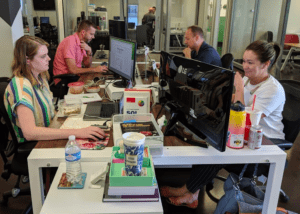Tabitha Myers- Owner, Midtown Law Q&A
Diversity in Entrepreneurship
March 8th is International Women’s Day, a day aimed to help nations worldwide eliminate discrimination against women. As we reflect on the work of so many great woman in history we wanted to also highlight a local woman entrepreneur who boldly calls out the discrimination in her field and fights for equality. Meet none other than Tabitha Myers, Esq. owner of Midtown Law.
Tell us about yourself and your background.
Raised in Chandler, Arizona, I graduated from Arizona State University with a Political Science degree. While attending law school at the Drexel University School of Law in Philadelphia, Pennsylvania, I became the first Drexel Law student to earn spots on both the Moot Court Board and the Drexel Law Review.

After law school, I returned to my home state of Arizona and practiced law for a decade in some of the largest and smallest Phoenix firms. I founded Midtown Law in 2019 with the mission to meet the personalized legal needs of small business owners—with fair, flat rate fees.
As a community activist and a “good trouble-maker,” I value bringing light to important issues. I wrote an article in Arizona Attorney Magazine calling out the sexism in Arizona’s legal industry, particularly in some of the state’s largest law firms. Additionally, I donate time to the Urban Phoenix Project, an advocacy group fighting municipal zoning decisions that negatively impact pedestrians and alternative transportation such as walking, biking, and transit. I also sit on the City of Phoenix’s Tree and Shade Subcommittee, a group working with city leaders to achieve a 25% average tree canopy coverage in the city by 2030.
Other professional affiliations, recognition, and involvement include:
- Member of the Arizona Cannabis Bar Association and the National Cannabis Bar Association.
- Regularly teach cannabis law programs, both nationally and locally.
- Recognized as a Super Lawyers “Rising Star” for the past 4 years.
What is the story behind your business?
It was June of 2019, and after 8.5 years of working for a string of disappointing law firm employers, I was either going to quit practicing law all together, or start my own firm. I felt, after my years of practice, that the current law firm model was broken and I was frustrated by the lawyer work culture.
With the support and urging of my partner, I started my own firm, determined to create a different law firm model—one that provides quality legal services with a reasonable and transparent pricing structure. My firm, Midtown Law, provides flat rate fees for most services –something that is not very common in the legal field other than in family law or estate planning. I started on a shoe-string budget, renting a private desk at a local co-working space (shout out to Co+Hoots!) with the idea that if I could keep my overhead low, I could pass those savings along to my clients. Two years later, my firm is growing and thriving, and I am still operating with one eye on my budget, in order to keep my fees reasonable for small local businesses.
Have you faced any trials as a woman in your industry? If so, what were they?
Where do I begin? It’s no secret that the legal field is a male-dominated industry and is plagued by many of the systematic biases that infect other male-dominated fields.
When I was a young attorney and tried to network within my other professionals, I often got romantic solicitations macerating as “networking.” I would get invitations to “network” over coffee, only to quickly realize that the invitation was not a professional one.
I’ve also had difficulty finding mentors in my field. In my experience, male attorneys were more interested in mentoring other male attorneys. Many of the seasoned female attorneys I worked with seemed more interested in pulling up the ladder behind them.
I’ve been called all sorts of various derogatory “pet” names by both opposing counsel and clients alike. Honey, sweetee, babe–I’ve been called them all. It was not uncommon for the client or senior attorney to ask me to get a beverage, make a copy, or perform a myriad of other administrative tasks that a male attorney would never be asked to do. Women in my field just have to give more of themselves to be treated less equally. At one large firm I worked for, the female attorneys were in charge of planning and organizing the baby showers, birthday parties, and other social events—all events that contributed to a positive work culture (and thus benefited the ownership of the firm), but which the male attorneys were never asked to contribute to, and which they did not attend. As a general matter, many law firms in Arizona don’t give paid maternity or paternity leave, so opportunities to have a family (if I had wanted) were not financially feasible for me.
The list goes on and on.
What motivates you to continue as an entrepreneur?
Being an entrepreneur is a great fit for my personality. Before I became an entrepreneur, I felt like I was a bit of a misfit, struggling to fit in with one employer after another. Now that I have the opportunity to be around other entrepreneurs, I realize that entrepreneurs are the misfits of the working world, and that there is more of us than I realized. That “misfit” attitude is a great mindset for an entrepreneur! We think outside the box, we question everything, and we aren’t afraid to abandon processes that aren’t working for us. It’s the perfect mindset for a small business owner!
that I have the opportunity to be around other entrepreneurs, I realize that entrepreneurs are the misfits of the working world, and that there is more of us than I realized. That “misfit” attitude is a great mindset for an entrepreneur! We think outside the box, we question everything, and we aren’t afraid to abandon processes that aren’t working for us. It’s the perfect mindset for a small business owner!
What is the most fulfilling part of what you do?
Working for myself and directly for my clients is so incredibly rewarding. Clients hire me because they have a legal problem they need to solve. Sometimes, just having someone on their side to fight for them, or to take over handling the issue is a weight off their shoulders. I can see the visible relief wash over their face as they leave my office. Other times, I see that relief once the project or matter has concluded. Either way, I am able to help people–which is the best part of my job.
What’s one word of encouragement you would give to other woman entrepreneurs?
I always revert to one of my favorite quotes by Shirley Chisholm, the first black woman elected to Congress and the first female to run for a major party’s presidential nomination. She said, “If they don’t give you a seat at the table, bring a folding chair.” Starting and running your own business is the metaphorical equivalent of bringing your own folding chair to the table.
Don’t wait for an invitation– you will not get one. Do it anyway.
